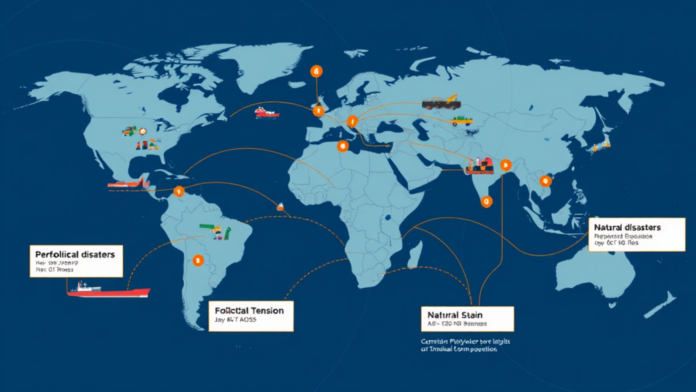Introduction to Global Supply Chain Disruptions
Definition and Overview
Global supply chain disruptions refer to significant interruptions in the flow of goods and services across international borders. These disruptions can arise from various factors, including natural disasters, geopolitical tensions, and pandemics. Such events can severely impact businesses, leading to delays and increased costs. It is crucial to read these dynamics. Awareness is key.
Historical Context and Recent Events
The historical context of global supply chain disruptions reveals a pattern of vulnerabilities. Events such as the 2008 financial crisis and recent pandemics have exposed systemic weaknesses. These incidents have led to significant economic repercussions. Understanding this history is essential. Knowledge empowers decision-making.
Causes of Supply Chain Disruptions
Natural Disasters and Pandemics
Natural disasters and pandemics significantly disrupt supply chains. For instance, hurricanes can damage infrastructure, while pandemics can halt production. These events lead to increased costs and delays. Understanding these impacts is vital. Awareness can drive better planning.
Key factors include:
Each factor compounds the challenges faced by businesses. Preparedness is essential for resilience.
Geopolitical Tensions and Trade Policies
Geopolitical tensions and trade policies can severely impact supply chains. Tariffs and sanctions disrupt established trade routes. These changes lead to increased operational costs. Understanding these dynamics is crucial. Knowledge fosters strategic planning.
Key influences include:
Each factor complicates global commerce. Awareness is essential for adaptation.
Impact on Global Trade
Changes in Trade Volumes
Changes in trade volumes significantly affect global trade dynamics. For example, a decrease jn demand can lead to excess inventory. This situation increases holding costs for businesses. Understanding these trends is essential. Awareness can drive better inventory management.
Key impacts include:
Each factor influences market stability. Knowledge is power in decision-making.
Shifts in Trade Routes and Partnerships
Shifts in trade routes and partnerships can reshape global trade landscapes. For instance, new alliances may emerge in response to geopolitical changes. This evolution can enhance market access for businesses. Understanding these shifts is vital. Knowledge leads to strategic advantages.
Key effects include:
Each factor influences business operations. Adaptation is crucial for success.
Effects on Businesses
Operational Challenges
Operational challenges significantly impact businesses in various sectors. For example, supply chain disruptions can lead to production delays. These delays often result in lost revenue and customer dissatisfaction. Understanding these challenges is essential. Awareness can drive proactive solutions.
Key issues include:
Each factor complicates business efficiency. Adaptation is necessary for survival.
Financial Implications and Costs
Financial implications and costs associated with supply chain disruptions can be substantial. Increased logistics expenses often arise from rerouting shipments. These additional costs can erode profit margins significantly. Understanding these financial dynamics is crucial. Knowledge enables better financial planning.
Key considerations include:
Each factor affects overall profitability. Awareness is essential for informed decision-making.
Strategies for Mitigating Disruptions
Diversification of Suppliers
Diversification of suppliers is a critical strategy for mitigating disruptions. By sourcing from multiple suppliers, businesses can reduce dependency on a single source. This approach enhances resilience against supply chain shocks. Understanding this strategy is indispensable. Knowledge fosters better risk management.
Key benefits include:
Each benefit strengthens operational stability. Awareness is key to effective planning.
Investment in Technology and Automation
Investment in technology and automation can significantly enhance supply chain resilience. By implementing advanced systems, businesses can streamline operations and improve efficiency. This approach reduces the likelihood of disruptions. Understanding these technologies is crucial. Knowledge leads to informed investment decisions.
Key advantages include:
Each advantage supports better decision-making. Awareness is vital for strategic growth.
Case Studies of Affected Industries
Manufacturing Sector
The manufacturing sector has faced significant challenges due to supply chain disruptions. For instance, automotive manufacturers experienced production halts due to semiconductor shortages. These interruptions led to substantial revenue losses. Understanding these impacts is essential. Awareness can drive better strategic planning.
Key examples include:
Each example illustrates the sector’s vulnerability. Knowledge is crucial for future resilience.
Retail and E-commerce
The retail and e-commerce sectors have been significantly impacted by supply chain disruptions. For example, many retailers faced inventory shortages during peak shopping seasons. These shortages resulted in lost sales opportunities and customer dissatisfaction. Understanding these challenges is vital. Awareness can enhance operational strategies.
Key issues include:
Each issue affects overall profitability. Knowledge is essential for effective management.
Future Trends in Supply Chain Management
Resilience and Sustainability
Resilience and sustainability are becoming critical in supply chain management. Companies are increasingly adopting eco-friendly practices to enhance their operational stability. This shift can lead to long-term cost savings. Knowledge fosters strategic decision-making.
Key trends include:
Each trend supports environmental responsibility. Awareness is vital for future success.
Emerging Technologies and Innovations
Emerging technologies and innovations are reshaping supply chain management. For instance, artificial intelligence enhances demand
Conclusion and Recommendations for Businesses
Key Takeaways
Key takeaways emphasize the importance of adaptability in business strategies. Companies must invest in technology to enhance efficiency. This investment can lead to significant cost savings. Understanding market dynamics is essential. Knowledge drives informed decision-making.
Recommendations include:
Each recommendation supports long-term resilience. Awareness is crucial for success.
Actionable Steps for Business Leaders
Business leaders should prioritize supply chain diversification. This strategy mitigates risks associated with disruptions. Additionally, investing in technology enhances operational efficiency. Improved efficiency can lead to cost reductions.
Key actions include:
Each action supports strategic resilience. Awareness is essential for informed leadership.

